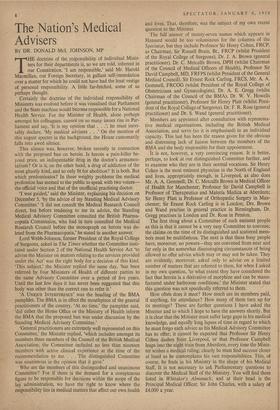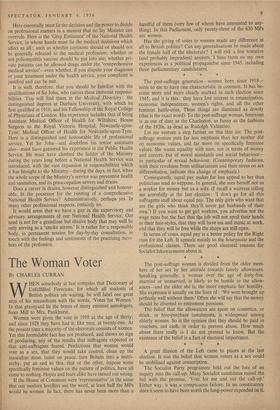The Nation's Medical Advisers
BY DR. DONALD Md. JOHNSON, MP HE doctrine of the responsibility of individual Minis- ters for their departments is, so we are told, inherent in our Constitution. 'I am responsible,' said Mr. Harold Macmillan, our Foreign Secretary, in gallant self-immolation over a matter for which he could not have had the least vestige of personal responsibility. A little far-fetched, some of us perhaps thought.
Certainly the doctrine of the individual responsibility of Ministers was evolved before it was visualised that Parliament and the State machine would become responsible for a National Health Service. For the Minister of Health, alone perhaps amongst his colleagues, cannot on so many issues rise in Par- liament and say, 'It is my opinion that . . .': he must inevi- tably declare, 'My medical advisers . . .' On the mention of this august spectre in the background, the House customarily falls into awed silence.
This silence was, however, broken recently in connection with the proposed ban on heroin. Is heroin a pain-killer be- yond price, an indispensable dfug in the doctor's armamen- tarium? Or is it, on the other hand, a drug of addiction of the most ghastly kind, and so only fit for abolition? It is both. But which predominates? In these weighty problems the medical profession has seemed to the public to speak with two voices— the official voice and that of the unofficial practising doctor.
`I was guided,' said the Minister, explaining his decision on December 5, 'by the advice of my Standing Medical Advisory Committee.' I did not consult the Medical Research Council direct, but before tendering to me its advice, the Standing Medical Advisory Committee consulted the British Pharma- copceia Commission, who had in turn consulted the Medical Research Council befOre the monograph on heroin was de- leted from the Pharmacopoeia.' he stated in another answer.
Lord Webb-Johnson, former President of the Royal College of Surgeons, asked in The Times whether the Committee insti- tuted under Section 2 of the National Health Service Act 'to advise the Minister on matters relating to the services provided under the Act' was the right body for a decision of this kind. `This subject,' the Minister replied the same day, 'has been referred by four Ministers of Health of different parties to the same Advisory Committee over a period of five years. Until the last few days it has never been suggested that this body was other than the correct one to refer it.'
`A UNIQUE INTERFERENCE' was the heading of the BMA pamphlet. The BMA is in effect the mouthpiece of the general practitioners of the country. 'At no time,' the pamphlet said, `did either the Home Office or the Ministry of Health inform the BMA that the proposed ban was under discussion by the Standing Medical Advisory Committee.' .. `General practitioners are extremely well represented on this Committee,' the Minister replied, 'which includes amongst its members three members of the Council of the British Medical Association; the Committee included no less than nineteen members with active clinical experience at the time of the recommendation to me. . . . The distinguished Committee was unanimous in the opinion that it gave.'
Who are the members of this distinguished and unanimous Committee? For if there is the demand for a conspicuous figure to be responsible for decisions within the scope of the lay administration, we have the right to know where the responsibility lies in medical matters that affect our own health and lives. That, therefore, was the subject of my own recent question to the Minister.
The full answer of twenty-seven names which appears in Hansard would be too voluminous for the columns of the Spectator, but they include Professor Sir Henry Cohen, FRCP. as Chairman, Sir Russell Brain, Bt., FRCP (whilst President of the Royal College of Surgeons), Dr. J. A. Brown (general practitioner), Dr. C. Metcalfe Brown, DPH (whilst Chairman of the Council of Medical Officers of Health), Professor Sir David Campbell, MD, FRFPS (whilst President of the General Medical Council), Sir Ernest Rock Carling, FRCS, Mr. A. A. ' Gemmell, FRCOG (whilst President of the Royal College of Obstetricians and Gynaecologists), Dr. A. E. ,Gregg (whilst Chairman of the Council of the BMA), Dr. W. V. Howells (general practitioner), Professor Sir Henry Platt (whilst Presi- dent of the Royal College of Surgeons), Dr. F. R. Rose (general practitioner) and Dr. S. Wand (general practitioner).
Members are appointed after consultation with representa- tive medical organisations, including the British Medical Association, and serve (so it is emphasised) in an individual capacity. This last has been the reason given for the obvious and distressing lack of liaison between the members of the BMA and the body responsible for their appointment. It is not, however, a very convincing reason. It is better, perhaps, to look at our distinguished Committee further, and to examine who they are in their normal vocations. Sir Henry Cohen is the most eminent physician in the North of England and lives, appropriately enough, in Liverpool, as also does Mr. A. A. Gemmell; Dr. C. Metcalfe Brown is Medical Officer of Health for Manchester; Professor Sir David Campbell is Professor of Therapeutics and Materia Medica at Aberdeen; Sir Henry Platt is Professor of Orthopaedic Surgery in Man- chester; Sir Ernest Rock Carling is in London; Drs. Brown and Wand practise in general practice in Birmingham, Dr. Gregg practises in London and Dr. Rose in Preston.
The first thing about a Committee of such eminent people as this is that it cannot be a very easy Committee to convene; the claims on the time of its distinguished and scattered mem- bers must be multifarious. The next is that these busy people have, moreover, no powers—they are convened from near and far only in the somewhat discouraging circumstances of being allowed to offer advice which may or may not be taken. They are evidently, moreover, asked only to advise on a limited number of matters that are referred to them, for when I asked in my own question, `to what extent they have considered the fact that heroin is a derivative of morphine and can be manu- factured under bathroom conditions,' the Minister stated that this question was not specifically referred to them. How ofteh does it meet? How much are its members paid, if anything, for attendance? How many of them turn up for its meetings? These are further questions I have asked the Minister and to which I hope to have the answers shortly. But it is clear that the Minister must suffer large gaps in his medical knowledge, and equally long lapses of time in regard to which he must forgo such advice as his Medical Advisory Committee has to offer; it cannot be expected that Professor Sir Henry Cohen dashes from Liverpool, or that Professor Campbell leaps into the night train from Aberdeen, every time the Minis- ter wishes a medical ruling; clearly he must find succour closer at hand as he contemplates his vast responsibilities. This, of course, he finds in his Ministry in the shape of his Medical Staff. It is not necessary to ask Parliamentary questions to discover the Medical Staff of the Ministry. You will find them listed in Whitaker's Almanack; and at their head is the Principal Medical Officer, Sir John Charles, with a salary of £4,000 a year. Here essentially must lie the decision and the power to decide on professional matters in a manner that no lay Minister can overrule. Here is the 'Grey Eminence' of the National Health Service, in whose hands must lie the medical decisions which affect us all : such as whether cortisone should or should not be generally released to the medical profession; whether or not poliomyelitis vaccine should be put into use; whether pri- vate patients can be allowed drugs under the 'comprehensive medical service'—even whether, if you dispute your diagnosis or your treatment under the health service, your complaint is justified and can be met.
It is well, therefore, that you should be familiar with the qualifications of Sir John, who carries these immense responsi- bilities. You will find them in the Medical Directory: the distinguished degrees at Durham University, with which he first qualified in 1916; and his Fellowship of the Royal College of Physicians of London. His experience includes that of being Assistant Medical Officer of Health for Wiltshire; House Surgeon to the Royal Victoria Hospital, Newcastle-upon- Tyne; Medical Officer of Health for Newcastle-upon-Tyne. Here is a distinguished and honourable life of professional service. Yet Sir John--and doubtless his senior assistants also—must have garnered his experience in the Public Health Service. He must have climbed the ladder of the Ministry during the years long before a National Health Service was introduced, with the vast expansion in responsibilities which it has brought to the Ministry—during the days, in fact, when the whole scope of the Ministry's service was preventive health and sanitation, and its preoccupation sewers and drains.
Does a career in drains, however distinguished'and honour- able, fit the possessor for the running of a comprehensive National Health Service? Administratively, perhaps yes. In many other professional respects, certainly no.
It would seem that we have a gap in the supervisory and advisory arrangements of our National Health Service. Our need is not for a grandiose but elusive body that may well be only serving as a 'smoke screen.' It is rather for a responsible body, in permanent session for day-by-day consultation, in touch with the feelings and sentiments of the practising mem- bers of the profession.



































 Previous page
Previous page